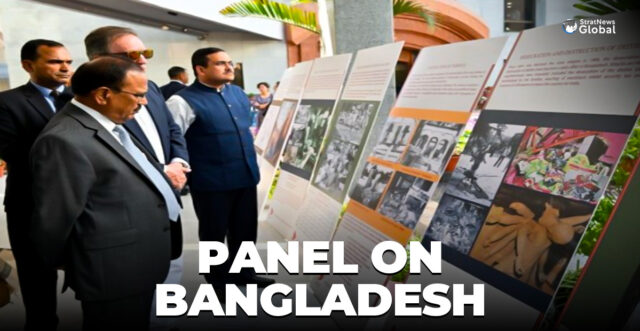The Vivekananda International Foundation (VIF) hosted an exhibition and panel discussion titled “The Never-Ending Persecution of Minorities in Bangladesh,” drawing attention to the widespread discrimination and violence faced by religious and ethnic minorities in the country.
Held at the VIF Auditorium in New Delhi, the event brought together prominent diplomats, journalists, and scholars to discuss the ongoing human rights crisis. The panel featured former Deputy National Security Advisor and VIF Vice Chairman Amb. Satish Chandra, former High Commissioner to Bangladesh Amb. Veena Sikri, journalist François Gautier, and Dr. Anirban Ganguly, Chairman and Trustee of the Dr. Syama Prasad Mookerjee Research Foundation. The session was moderated by VIF Director Dr. Arvind Gupta.
A significant moment during the event was the presence of India’s National Security Advisor (NSA), Ajit Doval, who visited the exhibition and participated in the discussion. His attendance underscored India’s concern regarding the deteriorating situation of minorities in Bangladesh, a matter that has long been a point of regional and international attention.
The exhibition, curated by the Foundation Against Continuing Terrorism (FACT), presented compelling evidence of human rights abuses, forced displacements, and targeted attacks on Hindu, Buddhist, Christian, and Ahmadiyya Muslim communities in Bangladesh. It featured photographs, case studies, and historical documentation aimed at raising awareness and encouraging urgent dialogue on the issue.
The persecution of minorities in Bangladesh has been a persistent issue, with reports from human rights organizations highlighting instances of violence, illegal land seizures, and institutionalized discrimination.
The situation has escalated following the recent unrest in the country, particularly after Prime Minister Sheikh Hasina was forced to seek refuge in India on August 5. Her departure followed widespread violence led by student groups reportedly backed by extremist and foreign elements.
Since Hasina’s exit, Bangladesh’s caretaker government, headed by Mohammad Yunus, has faced criticism for delaying elections while allowing extremist groups to operate with impunity. This has further deepened the insecurity faced by minority communities across the country.
By organizing this event, the VIF, one of India’s leading think tanks, reaffirmed its commitment to advocating for human rights and promoting informed discourse on regional security and the protection of vulnerable communities in South Asia.
In a career spanning three decades and counting, Ramananda (Ram to his friends) has been the foreign editor of The Telegraph, Outlook Magazine and the New Indian Express. He helped set up rediff.com’s editorial operations in San Jose and New York, helmed sify.com, and was the founder editor of India.com.
His work has featured in national and international publications like the Al Jazeera Centre for Studies, Global Times and Ashahi Shimbun. But his one constant over all these years, he says, has been the attempt to understand rising India’s place in the world.
He can rustle up a mean salad, his oil-less pepper chicken is to die for, and all it takes is some beer and rhythm and blues to rock his soul.
Talk to him about foreign and strategic affairs, media, South Asia, China, and of course India.





